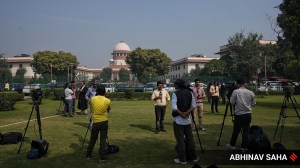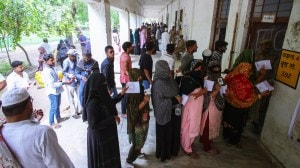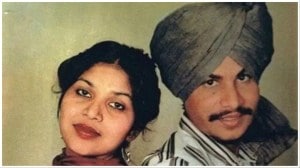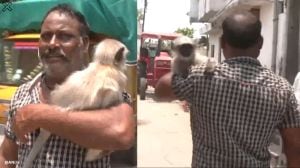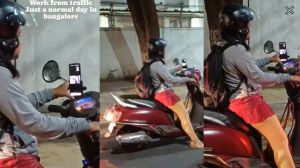- India
- International
Samjhauta blast case verdict: All four walk free in attack that killed 68
The trial began in August 2012 and was conducted on 132 days. Several judges changed during the trial. The last one — Additional Sessions Judge Jagdeep Singh — was allotted the case in August 2018.
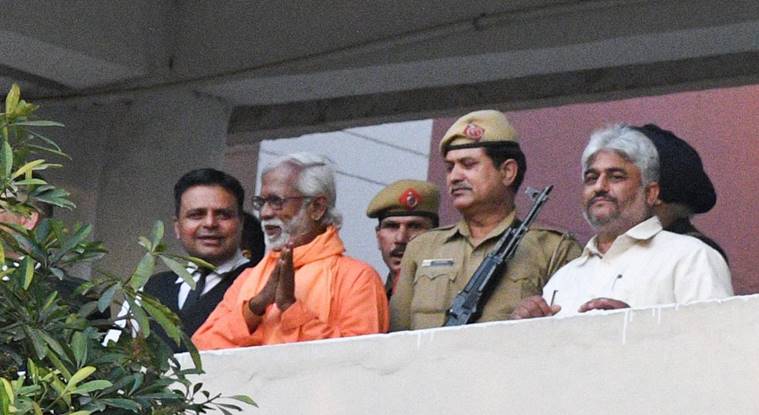 Swami Aseemanand after a special court acquitted him along with three others in the Samjhauta train blast case, Panchkula (PTI Photo)
Swami Aseemanand after a special court acquitted him along with three others in the Samjhauta train blast case, Panchkula (PTI Photo)
Concluding that the NIA “failed to prove the charge of conspiracy” in the Samjhauta Express blast case that left 68 people, mostly Pakistanis, dead in February 2007, a special court in Panchkula Wednesday acquitted all four accused including Naba Kumar Sarkar alias Swami Aseemanand.
Emerging from the court room, NIA counsel Rajan Malhotra said: “The court has acquitted all accused and concluded that the prosecution failed to prove the charge of conspiracy. It was a long-drawn trial, many of the witnesses turned hostile and, as per the verdict, the chain of evidence could not be proven.” He said the agency would study the judgment and then decide whether it can be challenged before the High Court.
The four acquitted were Aseemanand, Lokesh Sharma, Kamal Chauhan and Rajinder Chaudhary. Aseemanand has already been acquitted in Hyderabad’s Mecca Masjid blast case and the Ajmer dargah blast case. Samjhauta blast case: He suffered for 10 years, says Aseemanand’s brother
Sixty-eight people including 43 Pakistan citizens, 10 Indian citizens and 15 unidentified people were killed in the blasts which took place on the Attari-bound Samjhauta Express on February 18-19 night in 2007. Two explosions took place in two unreserved coaches between Diwana and Panipat in Haryana. Two bombs that did not go off were recovered later.
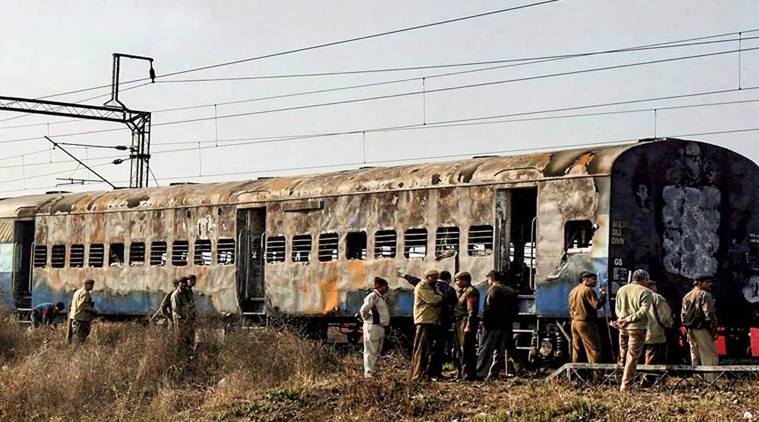 Samjhauta express blast: A total of 43 Pakistan citizens were killed in the terrorist attack.
Samjhauta express blast: A total of 43 Pakistan citizens were killed in the terrorist attack.
Read | Samjhauta Express blast: Anything could have happened, say survivors
Of 299 witnesses in the case, 224 deposed before the court. Of these, 51 turned hostile, changing their statements recorded earlier. While 53 of the 299 witnesses were given up by the prosecution, nine died during the trial and 13 were in Pakistan. After the verdict, Manbir Singh Rathi, counsel for Aseemanand, said: “He has been a victim of political terrorism.”

One of the defence lawyers said: “The link evidence could not be proved by the prosecution because their main witnesses to the alleged conspiracy did not support the case. Of the remaining witnesses who deposed, some 70-80 were those who had only identified bodies, the doctors who had conducted post-mortem examinations. It was all circumstantial evidence, with no backing of witnesses.”
Explained | Samjhauta Express blast case: Who were the accused? What did NIA chargesheet say?
Among the witnesses who turned hostile was Gujarat resident Bharat Bhai. The NIA had claimed that the alleged conspiracy meeting took place at his home. Others included witnesses who the NIA said were known to the accused and had knowledge of the conspiracy.
The Pakistani witnesses never appeared before the trial court despite summons and communication through the Ministry of External Affairs. The NIA said the Pakistan government was approached three times with the summons but there was no response.
Read | ‘Who will answer for death of my five children?’
Before the verdict, the court declined to accept the application of Pakistan resident Rahila Wakil, daughter of one of the victims, for permission to let Pakistani witnesses depose before the court, saying it was apparent that the application “is nothing but an effort to seek publicity in the name of espousing some noble cause and bare perusal of the records would reveal that application lacks bonafide and is apparently an effort to get the matter prolonged for reasons best known” to her.
Along with Aseemanand, the three put on trial were Kamal Chauhan, Rajinder Chaudhary and Lokesh Sharma, lodged in Central Jail Ambala. Three accused, Amit Chouhan (Ramesh Venkat Malhakar), Ramchandra Kalsangra and Sandeep Dange, have been declared proclaimed offenders. Another accused, Sunil Joshi — the NIA called him the mastermind — was killed in December 2007 in Dewas, Madhya Pradesh.
The trial began in August 2012 and was conducted on 132 days. Several judges changed during the trial. The last one — Additional Sessions Judge Jagdeep Singh — was allotted the case in August 2018 by which time most witnesses had already been examined during the trial.
The NIA had said Aseemanand was the main ideological support behind the conspiracy and had provided some financial support to those who carried out the attack. The agency said Aseemanand was “quite upset” with “Islamic Jehadi terrorist attacks” on Hindu temples like Akshardham (Gujarat), Raghunath Mandir (Jammu) and Sankat Mochan Mandir (Varanasi) and he, along with his associates, “developed vengeance” against the Muslim community. The NIA claimed it was Aseemanand who came up with “bomb ka badla bomb”.
Apr 26: Latest News
- 01
- 02
- 03
- 04
- 05

















